They shared a love for medieval reenactment that they still pursue today, stepping into Since “retiring” from the seat-belt factory, Dorothy Jean has invested her the 1400s once a month at the Society for Creative Anachronism gatherings. Here all prodigious energies into singing with the church choir and running the Winston County participants most obey two rules: you must dress from before the 1600s and you must Self-Help Co-op. Her dedication has ramifications that extend beyond the borders of the
“I like my collards with hot sauce. I’ll drown
be chivalrous and courteous to all.
church plot they tend. Along with instructing this group of kids on planting vegetables, them in hot sauce.”
Few cheese makers know the ancient beginnings and history of cheese making she serves up some life lessons.“Show some respect!” is something they’re used to like Melanie and Mark.Their business is named “Keswick Creamery”—Keswick being an Old hearing. Respect is a big message in East Mississippi, and Dorothy Jean wants the kids to English name for a farm where cheese is made.“Cheese making likely predates recorded learn respect for their parents, each other, and most of all, the church.
history,” explains Melanie.“In Homer’s Odyssey, Cyclops carried his milk around in an old
“All we’re trying to do,” she says,“is make them feel like everybody’s somebody.”
goatskin and Odysseus found racks of cheese lining the giant’s cave.” Melanie goes on to say that Egyptian hieroglyphics dating to around 2000 B.C. show the cheese-making process, and the Romans created detailed cheese-making literature.
112 : o u t s t a n d i n g y o u t h
u n c o m m o n w i s d o m : 113
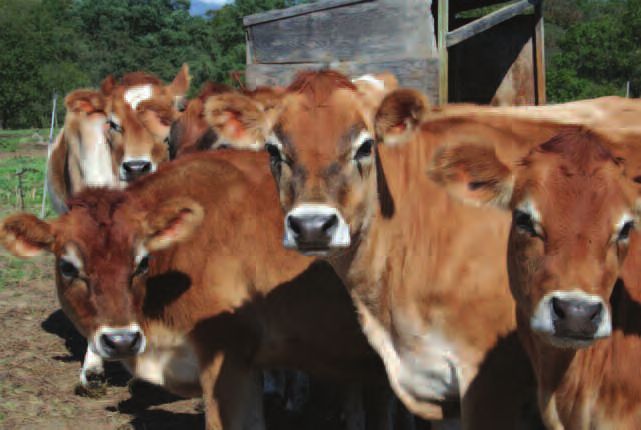
Mark and Melanie use natural calf
only their milk, a culture, and whatever type of organic fruit they add to each batch. Most rennet to make cheese from their milk,
mass produced yogurts add MPC (Milk Protein Concentrate) which is imported from similar to how the Cyclops mythically
countries like Ukraine and China as a “chemical” to avoid World Trade Organization tariffs made his cheese from goat rennet. Rennet
regarding dairy imports. Unknown chemicals and additives like this make parents all the is a substance that can be found in the
more excited about the all natural yogurt cups available from Keswick Creamery.
fourth stomach of any ruminant and is a
While most industrial dairy operations only milk their cows for two years, powerful coagulant that prevents the
followed by an all-expense-paid voyage to the dog food factory, the Dietrich Cochrans, animal from over-eating by solidifying
with their old-time philosophy of animal husbandry, obtain high quality milk from their excess milk in the stomach. While
animals for seven to nine years. Melanie’s mom, Susan, and her husband have managed medieval recipes called for adding a piece
the herd genetics and registered their bloodlines. With her professional degree in dairy of a calf’s stomach to milk, contemporary
science combined with her organic and grass-feeding practices, Melanie has her feet in producers extract rennet from calves.
both worlds.
Melanie smiles and explains that rennet is
Keswick Creamery is a family farm if there ever was one. Melanie’s sister, Emily, a hot button issue in vegan and farming
twenty-six, lives nearby with her boyfriend and teaches riding lessons on the farm to fifteen circles, but that it’s not actually an
to twenty students with her thirteen horses. She plans to move to a nearby farm and begin ingredient, but an enzyme that turns the
a horse boarding business for up to twenty-five animals. Melanie’s two younger brothers milk into solid curds and liquid whey, and
live on the property and work both on and off the farm. A young family friend, Clint, helps most of it drains off with the whey.
with milking and a variety of farm chores. While many farm workers in America don’t get Mark and Melanie have about
bonuses, Clint received his own cow for Christmas last year. Melanie laughs,“Clint is like a forty dairy cows which they milk twice a
brother. He should be a brother.”
day and pasture on grass throughout the
The rolling hills and Amish communities of rural Pennsylvania create fantastic year, except in wintertime. Of the cows
farming conditions, but for vibrant markets Melanie and Mark pack up their cheese, yogurt Melanie quips,“It’s like being surrounded
and ricotta and set up shop on Sundays at the Dupont Circle farmers’ market in by thousand pound teenagers.They’re
Washington, D.C.They also sell at markets in Tacoma Park, Maryland, and two others in the quite rambunctious.” Each cow has its own
D.C. metro area, about a two-hour drive from their farm.
name and produces around forty to forty-
While Keswick Creamery has proven a hit with the metropolitan crowd, Mark and five pounds of milk every day, of which half
Melanie increasingly focus on building local sales.They are excited that several is sold to a local milk cooperative and the rest used for cheese making. Selling cheese adds Pennsylvania restaurants now incorporate their cheeses into the menu and the couple sells value to their milk and also adds fun and family time as evidenced by how their young their products at the local Carlisle Central Farmers’ Market.
daughter Madelyn cavorts in her playpen near the production room as her parents labor Mark and Melanie are active in their community. Melanie is on the board of the over waxed wheels of cheese.
Pennsylvania Association of Sustainable Agriculture (PASA), has worked in the past as a 4-H
To refine their craft, Mark and Melanie have attended cheese-making workshops leader, and has helped organize the district fair in years past. At PASA’s 2006 conference, she
“It’s like being surrounded by thousand
all over the East Coast, studying under respected European cheese masters.The workshops led an all-day cheese track in collaboration with the Pennsylvania Cheese Alliance. She and pound teenagers.They’re quite
expand their technical expertise and inspire their creativity, resulting in new cheeses like friend, Sandy Miller, founded the Pennsylvania Farmstead and Artisan Cheese Association.
rambunctious.”
“Dragon’s Breath”—a pepperjack-styled cheese, and Wallaby—a monterey jack style named An educational and library space, a program for chefs to come learn about after one of their favorite cows.
farming, hosting school farm visits, these are all on the list of ideas that Melanie and Mark Mark and Melanie make all of their hard cheeses with raw milk, and began this discuss. Someday they hope to build an intern housing facility. Here they could host farm practice many years ago because of its cost-effectiveness.While much debate surrounds interns and instill their love and knowledge of cheese making to the next generation of this pasteurization, the Food and Drug Administration considers raw milk cheeses aged more ancient craft’s artisans. It’s all about learning,” says Melanie.“You can always learn more.You than sixty days to be safe. Federal and state law require that fresh cheeses and yogurts be can be ninety years old and learn more”.
pasteurized (heated to kill bacteria), but beyond that the Dietrich Cochran’s yogurt contains 114 : o u t s t a n d i n g y o u t h
u n c o m m o n w i s d o m : 115
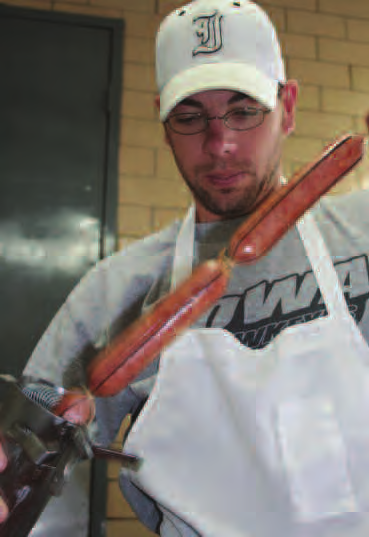
Bucking the Trend
catering. Now the torch has been passed to Joel and Liz, who both work six days a week greeting customers and preparing meat cuts. Their first son was born early in 2005 and their second child in late 2006. With the right encouragement, the Steege family may soon watch its fourth generation of meat processors learn the secrets of the trade.
Steege’s Meat Market lies amidst the long straightaways and looming silos that speckle the heart of Iowa corn country. Liz and Joel enjoy living in a small community because the people are trustworthy and have a laid-back attitude. What iowa : joel steege
Cedar Falls may lack in big city attractions, it makes up for with small town charm and friendly neighbors.
Joel adds,“I’ve grown up in a rural area my whole life. You’ve gotta drive to get Strolling into Steege’s Meat
anything you want or need, but it’s quiet and everybody knows everybody.”
Market outside Cedar Falls, Iowa will
Joel went to nearby Hawkeye College to get a degree in horticulture, but make your stomach growl. The rich,
decided that the world of plants and the monotony of Iowa landscaping jobs wasn’t for savory smell of fresh-cut, smoked bacon
him. He yearned to meet customers face-to-face throughout the day while responding greets you to the tune of “She’s Gone
to individual challenges.
Country” drifting from a stereo in back.
Liz, twenty-seven, feels privileged to work with her family and friends, but In a nation where “mystery
acknowledges that it is difficult to balance work and home life. With two young children, meat” and strange additives abound, Joel
Liz and Joel can hardly find a moment of free time.
Steege specializes in slaughtering locally-
“As long as I can pay my bills, support
The Steeges specialize in custom slaughter and processing for small farmers grown livestock and preparing meat for
my family, and come to work and enjoy it,
who bring in their own cattle and hogs. After the Steeges slaughter, skin, cut, and the very families that raised the animals.
I’m happy.”
package the meat, customers return to pick up hundreds of pounds worth of ground Joel opened the business with his wife,
beef, rib-eye steaks, bacon, and other cuts. Custom slaughtering accounts for about 80
Liz, and father, Larry, at the young age of
percent of their business, while the rest comes from retail sales of processed meats.
twenty-four.
Joel explains,“You bring your own animals in and you get your own meat back.
The Steeges base their business
That’s a big thing people like. They like how they raise it and they like how it tastes.”
on quality and customer service. Despite
During hunting season, the market also custom processes wild game for customers—
steady growth, Joel, now twenty-nine,
antelope, elk, deer.
remains humble about his ambitions.
Most of the farm animals the Steeges process are raised on pasture. Feedlot
“I got into this business knowing
operations work with industrial-sized slaughterhouses, not family operations like the that it’s never gonna make me a
Steeges. As he slices bacon, Larry says,“People are tired of the boxed beef and the millionaire, and that’s fine by me. As long
prepackaged meat from the grocery store.”
as I can pay my bills, support my family
Joel and Larry remain optimistic that demand for their services is growing and and come to work and enjoy it, I’m
people are reawakening to the appeal of local foods and the unique taste of meat from happy,” he says.
small operations. Custom slaughter is not only better tasting, but provides livestock Joel is the third generation in a
farmers with more affordable food, since they already own the meat and only pay for line of butchers beginning with his
the slaughter and preparation.
grandfather, who ran a meat locker in
The retail cooler brims with Italian sausage, cooked bratwurst with jalapeño rural Readlyn, Iowa, in the 1960s. Larry
peppers and cheese, smoked bacon, summer sausage, smoked pork link sausage, smoked took over for his father in 1975,
cheddarwurst, ground beef, ribeye steak, turkey breast, chicken, boneless beef chuck expanding the business to include
116 : o u t s t a n d i n g y o u t h
u n c o m m o n w i s d o m : 117
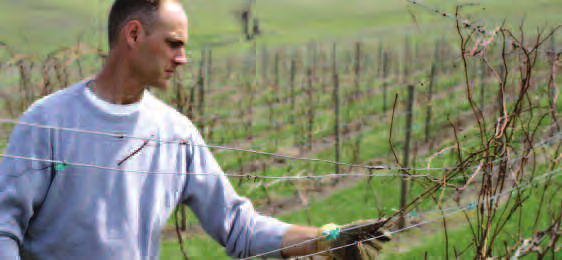
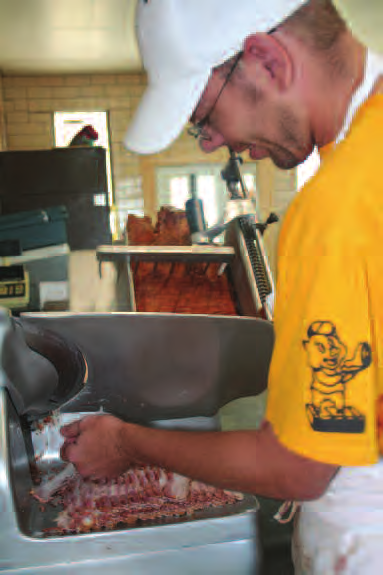
roast, Iowa ground horseradish sauce,
“Country Bar-B-Q Sauce,” and eight kinds
Native Wines, New Connections
of Wisconsin cheese.
“I try to familiarize myself with
every customer and make them feel like
I’d want to feel whenever I go into a
place,” Joel says.
To help foster community spirit,
the Steeges sponsor an annual golf
nebraska : tim nissen
tournament in Readlyn.“It’s just kind of
our way of thanking our customers for
being loyal,” Joel explains.
The tournament began nine
years ago and has now grown to 180
people, with a sizeable waiting list of
people craving to chow down on the
delicious food available at the Steeges’
all-day open grill.
Larry began a catering operation
that has blossomed with the addition of a
large mobile smoker that hitches up to
their truck. They cater large events on the
weekends, serving up homemade brats
and burgers as they socialize with the
local community.
The Steeges have much to look
forward to, with two young children and
a steadily growing business. As more local
residents choose quality local meat over
industrial alternatives, and more farmers
It's April, and the vineyard has survived a late freeze. On a windy Saturday, Tim want to taste the meat they’ve personally
Nissen, thirty-four, and his older brother Dave spend the morning planting new vines raised, Steege’s Meat Market will continue
and trimming back existing ones to prepare them for Nebraska’s summer growing to grow as it fills an important niche in
season. They've hired a few neighborhood youth to help with trimming and pulling the this agrarian community.
old vines out of the way.
Tim takes pride in giving young people a productive way to earn a little cash and do some good, old-fashioned farm work. He likes working with local youth and often gets kids from the same families, younger siblings taking the place of their older brothers and sisters that have graduated high school and moved on.“It’s really neat to see the kids grow year to year,” he says,“it’s one of the more rewarding parts of the business.”
118 : o u t s t a n d i n g y o u t h
u n c o m m o n w i s d o m : 119
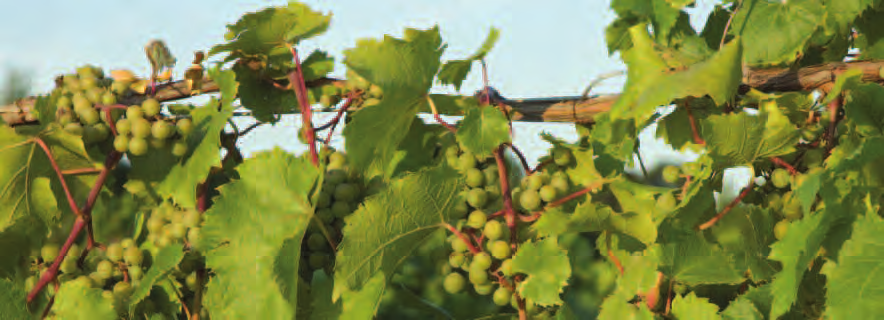
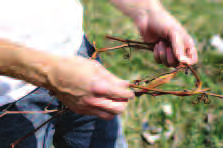
When you drive down Broadway Avenue in Hartington, a town of approximately 1,700 in the rolling hills of northeastern Nebraska, you pass by the Hotel Hartington, a turn-of-the-century brick building with covered windows and a faded, peeling sign. The bowling alley next door has been closed for a while, and the only buzzing business visible from the intersection of Broadway and State Street is Casey's gas station, a few blocks down the hill. The nearby town of Coleridge, Tim says, is just shy of being a ghost town.
Tim comments,“One reason rural Nebraska is depopulating—why the young people move away and never come back—is that they don't see a way to live in rural areas aside from what their parents or neighbors do. And if your parents don't seem very happy doing what they're doing, why on earth would you want to keep doing it?”
He continues,“Until we recognize that mainstream contemporary agriculture is not always appealing to rural youth—or urban youth, for that matter—and until we do something about promoting alternative approaches to agriculture and other vocations in the rural U.S., we are going to see more towns going the way of Coleridge.”
Tim is encouraged by the local poet and the local stained glass makers, but feels there is a long way to go in building awareness and understanding of the appeal of the countryside. This is what it will take to convince young people to settle in rural areas and embrace a rural way of life. Part of this appeal is found in unusual farms like the Nissens and others in his area. A dynamic group of forty-two farms in his small area are either organic or transitioning to organic, leading organic distributors to come here to source The business is young and growing, to be sure.Tim hopes that as appreciation for hard to find crops from the region. This growing network of organic farms is making local, organic, and sustainably-grown products grows, so too will his market share.“Organic small farming more viable and fighting the trend towards agricultural consolidation.
farming practices are not just environmentally important,”he says,“they are a fundamental Tim grew up near Bow Valley, an unincorporated town just north of Hartington.
consumer issue. Farms should be responsive to customer demand and I’m trying to listen to His four-hundred-acre farm lies just one and a half miles from the land his great the concerns of my customers.”
grandfather tilled in the 1880s. Tim’s dad bought the farm in 1956, and farmed it just like Tim is looking forward to the return of farm visits.“The recent growth of his grandfather had done nearby. Deep roots mean that the Nissens have a lot of cousins agritourism is a sure sign of our cultural need to return to the land and reconnect with and extended family in the area. A few years ago, Tim and his brother decided to use
“One reason rural Nebraska is
farmers,” he says.
some of the family's pasture land to create a vineyard. They started planting grapes, wild depopulating—why the young people
While Tim and his brother both have off-farm jobs, they’re working on a new plums, and chokecherries. Their vision? A fully functional, family-run vineyard supplied by move away and never come back—is that
business plan to see if jumping in full time makes sense. Dave and Tim enjoy working a couple hillsides planted with sustainably grown fruits. These slopes, once vulnerable to they don't see a way to live in rural areas
together and often find themselves on the same page.“It’s kinda eerie how we think erosion, now hold firm with deeply rooted vines and grass anchoring them down.
aside from what their parents or neighbors
alike!” he exclaims.
In 2007, Nissen Wines entered its fourth season, which meant some of the do. And if your parents don't seem very
Tim and Dave have benefited enormously from the mentorship of other vintners grape vines came into maturity. The twelve-acre vineyard includes four acres of wild happy doing what they're doing, why on
and grape growers in the area who have shown openness and eagerness to help younger plums, and one and a half acres of chokecherries. The family has already made wines earth would you want to keep doing it?”
growers get started.With the ease of Internet communications and the wealth of online from the these fruits. The wild plum is Tim’s favorite. He explains,“It’s a totally original resources available,Tim can be connected to others in his craft from all over the world. He taste that you simply can’t find anywhere else.” These indigenous fruits are relatively also finds support more locally from the Nebraska Sustainable Agriculture Society and the easy to grow, but challenging to turn into clear, marketable wines.
University of Nebraska.
The first public wine tasting—after the fall 2007 harvest—was a memorable affair.
These enthusiastic vintner brothers are bachelors, and when asked about this Tim Many wine tastings later, the Nissens are well on their way to establishing a loyal clientele quips with a wry smile,“Yeah, that’s one of the only drawbacks to living in a rural area.” But and are attracting people from over thirty miles away.They now offer seven different wines, with more visitors coming to the farm, who knows? As Tim remarks,“Everybody loves wine, and thirteen stores in two states have already picked up and are selling their wines.
all over the world.”
120 : o u t s t a n d i n g y o u t h
u n c o m m o n w i s d o m : 121

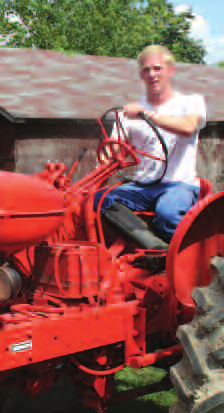
With Love and Prayer
continue their dairy operation in the “college style,” where cows were kept contained, fed special feed mixes, and the whole system was highly mechanized. In 1991, Steve Meerman and his sons decided they had to try something new or quit altogether.
The family decided to go back to pasture grazing their animals, allowing them to graze on “God’s natural bounty of fresh growing grass” instead of buying corn and hay. They slowly noticed improvements in production and animal health, and soon enough they were back on their feet as a family dairy. The Meermans were one of the first farms in the region to switch back to pasture grazing, and they now see a strong michigan : jesse & betsy meerman
movement building among farmers to return to a more natural course. They were certified organic in June 2007, which translates into higher prices for their milk and produce and ensures customers of their long-term commitment to the health of their The ingredients list on a package of
land and animals.
Jesse Meerman’s cheese lacks the usual
“It’s really catching on now,” says Jesse, referring to organic farming,“especially gibberish that only the most learned of
in the milk industry.“
consumers would understand. It lists only
Jesse went off to college in 1997 for a year and a half, playing competitive simple, natural ingredients, such as milk—and it
soccer and studying a variety of disciplines. Then news came that his father had cancer.
ends with “love,”“bravado,” or “prayer.”
He then returned to the farm to live and work as his dad recovered. Sadly, Steve passed Jesse chuckles as he explains that the
away in 2007. Now the youngest Meerman brother, Jay, has taken over his share of the USDA inspector surprisingly didn’t mind these
work, keeping this family farm strong and honoring their beloved father.
intangible ingredients. Every family member at
The Meermans maintain a diverse mix of chickens, cattle, pigs, ducks, and goats Grassfields Farm has a role to play and unique
(for cheese) along with large vegetable gardens—all of which end up on the skills to bring to the table, no matter how
Meermans’ plates and those of the local community. Jesse knew that their most young or old. Jesse and his wife, Betsy, hang
valuable resource was the rich and nutritious raw milk produced by their 140 dairy some bumblebee decorations over the bed of
cows. He didn’t like to see this resource degraded by the homogenization and their three year old daughter, Sophia, hoping
pasteurization processes, which destroy all of the beneficial bacteria and much of the that one day she may just become the family
vitamins and calcium in milk. Pondering this dilemma led Jesse to try cheese making as beekeeper. And with the recent birth of their
a way to add value and take advantage of the health benefits of raw milk.
second daughter, Katie, they feel confident that
After much research and family discussion, the Meermans set up a cheese a fifth generation of Meermans will preside
making facility next to their milk storage barn. They’ve gradually scaled-up production over these pastures.
to two thousand pounds of cheese per month. Because of their Dutch ancestry, the Although Jesse is only thirty-one years old, the Meermans have been on this family chose to craft Dutch cheeses like Leyden, Edam, and Gouda. It was this interest in fertile land near Lake Michigan since Jesse’s great-great-grandfather arrived in 1882. Their
“We’re not just responsible to the USDA, we’re
their roots which put them on the path to making these rare Dutch cheeses.
broad fields and woods lie in rural Coopersville, Michigan, where long straight roads lead responsible to our customers.”
To lock in fresh quality, Jesse makes cheese in the afternoon directly after the past many active farms and agricultural businesses. The Meermans are devoted Christians, noon milking when the raw milk is just minutes old. During the summer, Jesse and his like many in their nearby community, and cheerfully perpetuate the Midwest’s reputation older brother, Luke, milk the cows at noon and at midnight. They follow this unusual for friendliness.
schedule because the hot noon sun makes the cows uncomfortable. Bringing them in The agrarian tradition has been passed down through four Meerman the barn at this time provides a better cycle for the animals and reduces their stress.
generations, but not without times of great difficulty and crisis. The 1980s were an In the colder months, Jesse and Luke revert to a more common 4 a.m. and 4 p.m.
especially hard decade for family farms. Many went under due to rising input costs and milking schedule.
stagnant commodity prices. The Meermans soon realized that they could not afford to As Jesse tours the farm, he bends down and runs his fingers through various kinds of grasses, rattling off their names, attributes, and the nutritional value for the 122 : o u t s t a n d i n g y o u t h
u n c o m m o n w i s d o m : 123
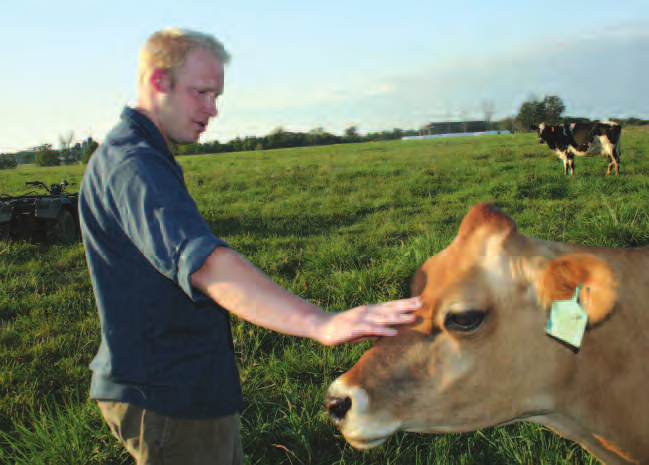
animals. He resembles a scientist, excitedly explaining a new invention. The taste and Jesse attributes much of the demand for their natural produce to concerned quality of Jesse’s cheese ultimately come from this grass, therefore, it is vital that he mothers who want the most nutritious food for their children. He laughs because his wife understands the soil and ecology of the farm. Being natural and organic just makes Betsy, a physician’s assistant, often leans more towards traditional medicine, while he sense to the Meermans. They believe this is closer to the way God intended farming constantly wants to try natural remedies. He believes good health is linked to keeping and are happy to distance themselves from today’s synthetic chemicals and genetically the land and animals as natural as possible. To prove his point, he explains that when modified organisms.
they switched the calves from the milk replacer advocated by university scientists to their Raw milk, despite its potential health benefits, cannot be sold in Michigan own raw milk, they noticed a marked improvement in the calves energy and growth.
because ensuring the uniformity and cleanliness of raw milk would require many The Meermans want to remain a family farm long into the future and keep regulations. Requiring milk to be pasteurized is a much simpler option. The Meermans looking for creative ways to make it possible. By educating and interacting with the legally drink their own raw milk,












